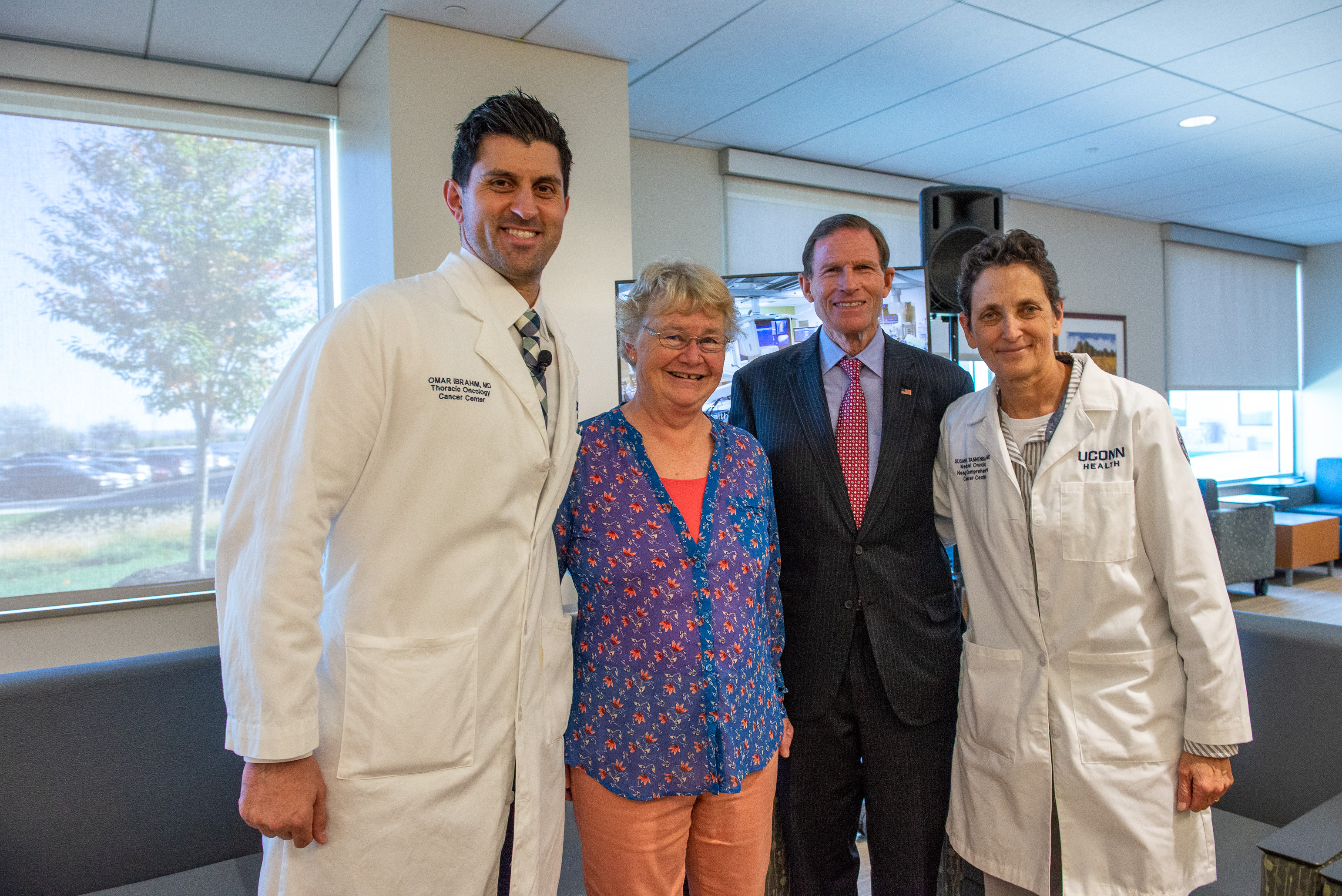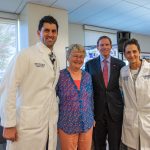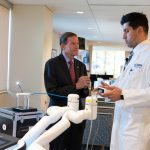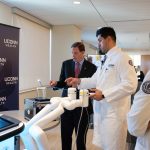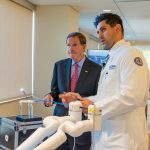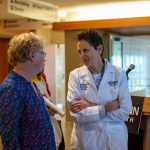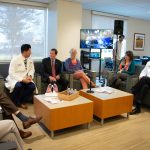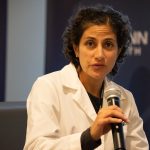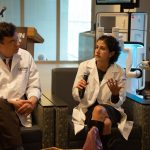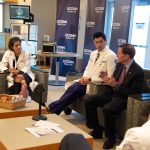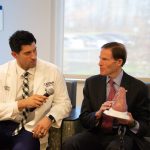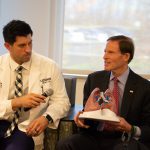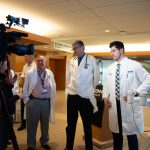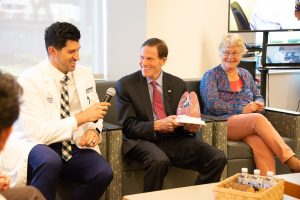 On Nov. 1 in honor of Lung Cancer Awareness Month Sen. Richard Blumenthal joined UConn Health’s Neag Comprehensive Cancer Center experts for a roundtable discussion to raise critical public health awareness.
On Nov. 1 in honor of Lung Cancer Awareness Month Sen. Richard Blumenthal joined UConn Health’s Neag Comprehensive Cancer Center experts for a roundtable discussion to raise critical public health awareness.
“Lung cancer is far and away the number one killer out of all cancers combined,” shared Dr. Omar Ibrahim, director of thoracic oncology and interventional pulmonology.
In fact, this year alone it is estimated that the disease will take the lives of 150,000 Americans and 230,000 will be diagnosed. Lung cancer is the deadliest cancer because most patients don’t have symptoms until the cancer is advanced, spreading from the lungs throughout the body.
Sen. Blumenthal and Ibrahim were joined by UConn Health’s leading pulmonologists, oncologists, radiologists, nurses and smoking cessation experts, along with Carol Pfeiffer who shared her personal story of surviving lung cancer.
Pfeiffer, with no smoking history or lung cancer family history, was surprisingly diagnosed in March with the disease. She shared how she benefited from UConn Health’s rapid expert care and innovative screening tools that minimally invasively diagnosed her lung cancer at an early stage.
Pfeiffer shared how happy she is that her lung cancer was found early: “All that is now in the rear view mirror. I’m feeling really well and delighted that I was cared for at UConn Health with such expertise and speed.”
Sen. Blumenthal added about Pfeiffer: “She is the poster child for detection, recovery and treatment. This place is the reason she has survived,” referencing the team care provided by UConn Health’s innovative and swift acting Lung Cancer Program and Lung Cancer Screening Program.
“Thanks for all your great work, keep it up,” shared Sen. Blumenthal along with how he is working on new legislation to help fuel their fight of lung disease. He also shared how his life was personally touched by the dangers of tobacco after his mother died of smoking-related disease.
“In the Congress I am trying to continue to lead the fight against big tobacco, and it has now become a fight against vaping and e-cigarettes,” shared Sen. Blumenthal. “We continue to face a public health crisis in this country because people continue to take into their lungs things that are destructive. The lungs weren’t designed to absorb those chemicals in vaping liquids, they are aerosols.”
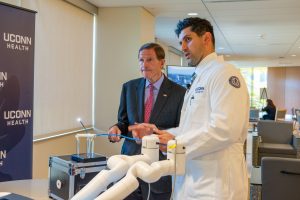
Sen. Blumenthal added: “We are on the verge of a new generation being hooked on nicotine. That’s what vaping has. Vaping has become an epidemic. My hope is that we can stop young people and adolescents from beginning lives of addiction and disease that results from tobacco smoking and the unknowns from vaping. The most effective way to stop kids from starting to vape is education.”
To spur earlier diagnosis and save more lives from lung cancer, UConn Health’s experts called on the general public to know their personal risk of lung cancer and to take swift action.
Experts stress that it is the only way to increase a person’s chance of surviving the deadliest cancer, which does not discriminate affecting both smokers and non-smokers. If high-risk for lung cancer, UConn Health experts urge patients to get screened with an initial low-dose computed tomography (CT) scan to improve their chance of an early diagnosis and long-term survival.
UConn Health’s Chief of Oncology, Dr. Susan Tannenbaum, shared the latest of what her team is seeing on the frontlines caring for lung cancer patients: “We are seeing more cancers in non-smokers and ex-smokers.”
Ibrahim added: “We have ways to identify these high risk patients sooner and we need to make sure the public knows.”
“High risk patients need to seek screening,” said Dr. Electra Kaloudis, director of UConn Health’s Lung Cancer Screening Program. “The majority of screenings are covered so there is really no reason that people shouldn’t get screened.”
Also, the expert panel called on all smokers of tobacco and users of other potentially harmful e-cigarettes and vaping products to immediately stop or seek the assistance of a smoking cessation program.
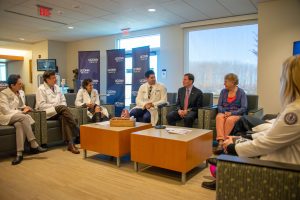 “I would encourage everybody to try to find one person who you know in your life who is high risk for lung cancer that should be screened who is a smoker,” stressed Ibrahim.
“I would encourage everybody to try to find one person who you know in your life who is high risk for lung cancer that should be screened who is a smoker,” stressed Ibrahim.
Sen. Blumenthal strongly agreed stating: “I would also urge you to find one young person who is vaping.”
The other participants of the expert roundtable from UConn Health’s Carole and Ray Neag Comprehensive Cancer Center included: Dr. Mark Metersky, director of pulmonology; Dr. Jonathan Hargreaves, radiologist and section head of thoracic imaging; Wendy Thibodeau, RN, MSN, OCN, nurse navigator; and Sarah Loschiavo, APRN, program director for oncology supportive care services.
Are your lungs clear? To make an appointment at the Lung Cancer Screening Program of the Carole and Ray Neag Comprehensive Cancer Center, call 844-777-LUNG or visit its website to learn more.
